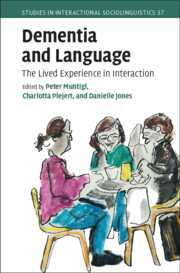Book contents
- Dementia and Language
- Studies in Interactional Sociolinguistics
- Dementia and Language
- Copyright page
- Contents
- Figures
- Tables
- Contributors
- Transcript notation key
- Part 1 Introduction
- Part 2 Dementia and Diagnostics
- Part 3 Dementia and Conversational Strategies
- Part 4 Dementia and Epistemics
- Part 5 Communicative Challenges in Everyday Social Life
- 12 Language and Cognition in Conversations with a Person with Alzheimer’s Disease
- 13 Using Digital Communication Support in Interaction Involving People with Dementia
- 14 “It’s More than Eating, It’s a Social Situation”
- 15 Social Quizzes for People Living with Dementia
- Index
- References
13 - Using Digital Communication Support in Interaction Involving People with Dementia
Interactional Strategies to Facilitate Participation and Engagement
from Part 5 - Communicative Challenges in Everyday Social Life
Published online by Cambridge University Press: 21 November 2024
- Dementia and Language
- Studies in Interactional Sociolinguistics
- Dementia and Language
- Copyright page
- Contents
- Figures
- Tables
- Contributors
- Transcript notation key
- Part 1 Introduction
- Part 2 Dementia and Diagnostics
- Part 3 Dementia and Conversational Strategies
- Part 4 Dementia and Epistemics
- Part 5 Communicative Challenges in Everyday Social Life
- 12 Language and Cognition in Conversations with a Person with Alzheimer’s Disease
- 13 Using Digital Communication Support in Interaction Involving People with Dementia
- 14 “It’s More than Eating, It’s a Social Situation”
- 15 Social Quizzes for People Living with Dementia
- Index
- References
Summary
This chapter explores the challenges faced by individuals with dementia and their caregivers in communication. It focuses on the potential of personalized communication applications on tablet computers to support interactions. While various communication aids have proven valuable in addressing dementia-related communication issues, digital tools like tablet computers are relatively new in this context. The analysis centers on two key aspects of interaction: caregivers’ use of questions and the management of communication support devices. Results reveal that questioning individuals with dementia can be both challenging and rewarding. The chapter emphasizes the importance of awareness regarding potential issues with certain types of questions and the readiness to address difficulties in interaction. Regarding the management of digital applications, the study suggests that aligning with the associations of the person with dementia and being responsive to their contributions may enhance conversation development. The findings underscore the significance of prioritizing conversation over facts and being attuned to the person with dementia’s conversational trajectory to promote their active participation and engagement. Overall, understanding how the management of communication support influences outcomes may enhance the effectiveness of such tools in facilitating meaningful conversations with individuals with dementia.
- Type
- Chapter
- Information
- Dementia and LanguageThe Lived Experience in Interaction, pp. 292 - 315Publisher: Cambridge University PressPrint publication year: 2024

